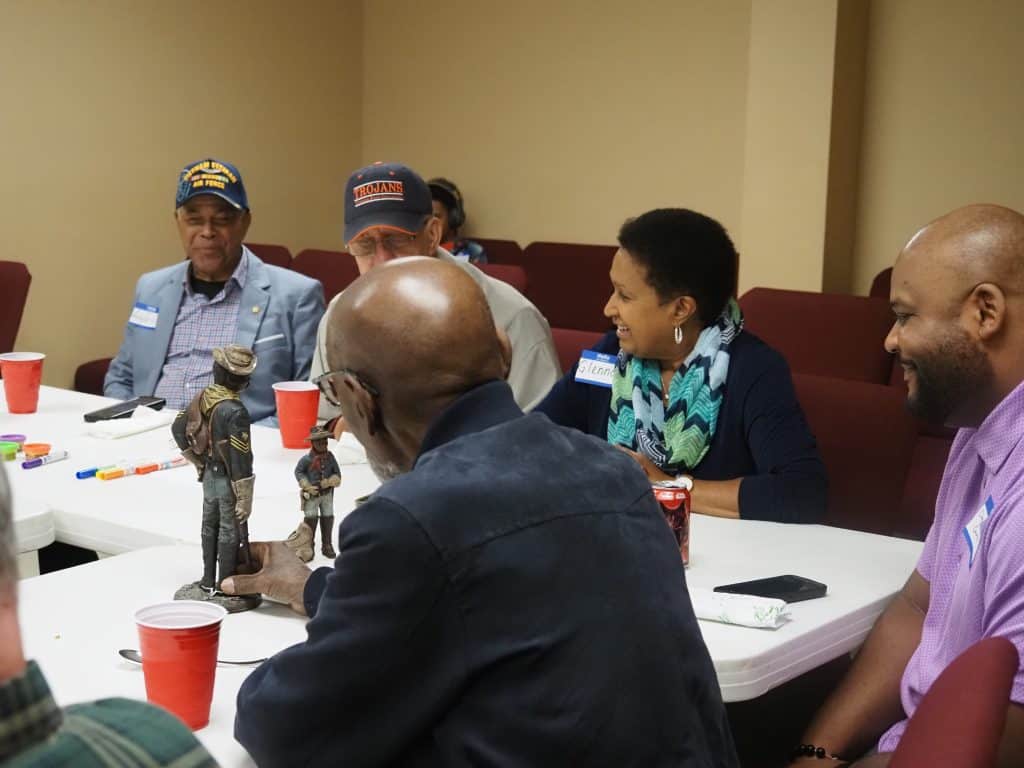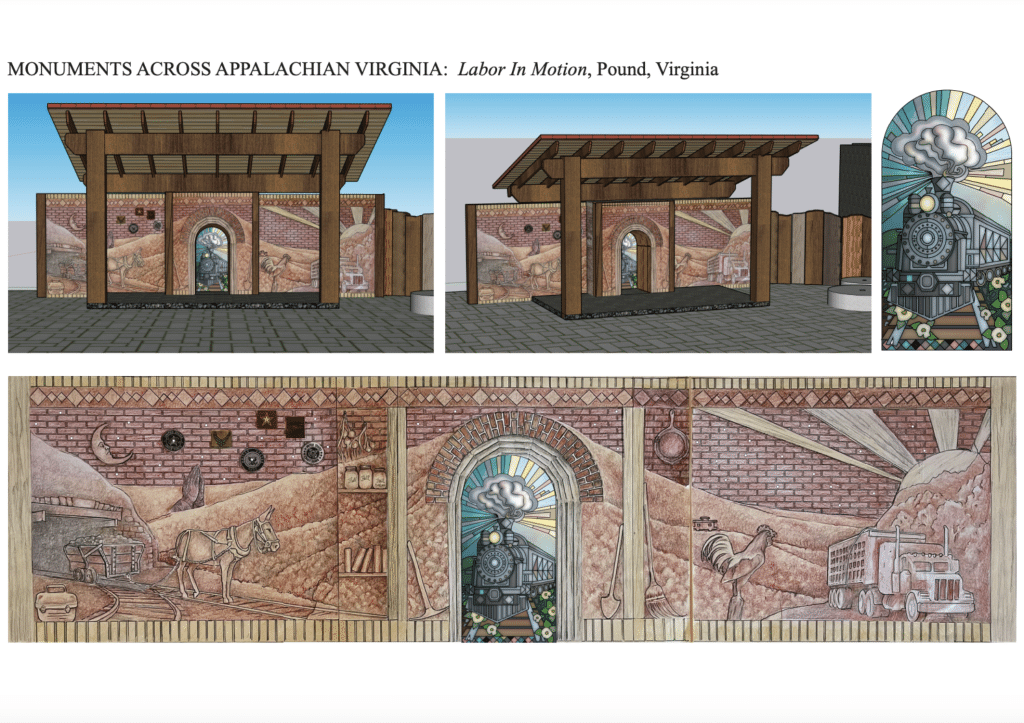Grundy, Va. Picks Up And Moves To Higher Ground
“We’re just moving a town,” says Grundy Town Manager Chuck Crabtree.
Experts call it a one-of-a-kind project. The funding scheme is unique, the partnerships are unheard of, and the change to the landscape will be significant. When the Grundy floodproofing and revitalization project is finished in 8-10 years, supporters say a town will be transformed from 6 acres of Depression-era storefronts to a model of rural renewal.
It will have the latest in wireless communications technology. It will be completely handicapped accessible. It will have a bikeway, a thriving business district and a bright economic future. Others say it is too risky and a waste of $177 million of taxpayer’s money.
Grundy is a Virginia coal-mining town set along the Levisa River, a tributary of the Big Sandy, about an hour’s drive from both Kentucky and West Virginia. In the early part of the 20th century, Grundy and surrounding Buchanan County had plenty of billionaires. If you wanted to shop, you came to Grundy. If you wanted to eat in a nice restaurant, you came to Grundy. If you wanted to work, you came to Grundy.
But that’s changed. Now the coal mines are mostly mechanized and most of the wealth has left. Businesses have been flooded out again and again. Most people are still paying off FEMA loans they used to rebuild after a catastrophic flood in 1977. “Without this project, Grundy has absolutely no economic future,” says Rep. Rick Boucher, D-Virginia.
Early Beginnings
Grundy began as a logging town. The only flat land was a narrow strip curving around the river. As the town grew, it continued to crowd that river. Coal mining replaced logging, but always there were floods.
There have been major floods roughly every 20 years since 1937. During those floods, more than 5 feet of water can run through downtown, leaving mud and lots of dead snakes in its wake. Lesser floods, especially from nearby Slate Creek, cover roads and seep into buildings four or five times a year.
In April of 1977, 16 inches of rain fell in one day upstream of Grundy. The swollen Levisa covered the town in nearly 6 feet of water. Three people died and the town sustained $15 million in damage. “We’ve never recovered,” says Crabtree. “The trade leakage has been incredible. We have people driving two hours just to get the necessities.”
According to Crabtree, most of the downtown buildings sit empty. “You can’t fix them up because you can only borrow half the appraised value,” he says. He points to a building beside Town Hall and says it’s appraised at $25,000. The maximum loan amount, $12,500, wouldn’t bring the building up to code. People who want to retire can’t sell their businesses.
Cooperative Economics
Politicians took notice of the ’77 flood, particularly a young state senator named Rick Boucher. By 1983, Boucher was a U.S. Representative. “When I was sworn in, the first thing I did was talk to county and town officials,” Boucher says. “My goal was to have each party make some financial commitments and for the financial commitments to equal the cost of the project.”
To qualify for federal money to floodproof the town, Grundy had to have a cost-sharing partner that would kick in 25 percent of the estimated $200 million project. “I had the state of Virginia in mind,” Boucher says. VDOT had earlier been mandated to widen U.S. 460 to four lanes through Buchanan County, but the estimated price tag on the project was $150 million. Virginia couldn’t afford it.
Boucher, known for bringing businesses to Southwest Virginia, was able to work a deal no one expected. “When have you ever heard of the Army Corps of Engineers and VDOT working together on anything?” Crabtree says.
“It took a bit to get us together,” admits Corps spokesman Steven Wright, but Boucher says he got them to “think outside the box” to find “a very creative solution.” The Army Corps and VDOT would combine their projects and significantly reduce the costs. The project went from $350 million to $177 million.
Under the current plan, VDOT will buy most of the Grundy business district at “fair market value” and demolish it to make way for an 8-foot levee, to be built by the Army Corps of Engineers. Then VDOT plans to build a widened section of U.S. 460 on top of that levee. The road itself will become a floodwall that engineers say will protect the historic Grundy courthouse and other architecturally significant buildings.
A new business district will be built on a mountain across the river, thanks to a process called “benching,” which requires significant cuts be made in the side of the mountain. These cuts (also called “shaving’) create flat “benches,” on which 13-acres of businesses and residences are to be built.
The Army Corps is well along on the benching project, and the estimated 2.3 million cubic yards of spoil is being transported to nearby Wellmore Hollow via a specially-built road. Crabtree hopes to see the spoil area developed into an additional 10-12 acres of flat land.
But it’s not a pleasant process for townsfolk. “There’s yellow dust an inch thick all over everything,” says Nell McGuire, owner of Grundy Paint and Wallpaper.
“When they put off a shot [of dynamite] over there, it’s like an earthquake,” says Mabel Ruble, owner of Main Street Floral.
Both women run businesses across the river from the construction site. Both will be bought out or relocated, and both support the project. “On Saturdays, the town’s dead. They’re hoping [the project will] bring other businesses in,” Ruble says.
New Hope
The project has already brought one business to town, a new Comfort Inn, built and operated by Dominion Lodging, a Virginia hotelier. Crabtree says lodging taxes from the hotel bring in more revenue than property taxes. According to Dominion vice-president Craig Andersen, the hotel has a 60 percent occupancy rate, at or slightly above the national average.
Crabtree, Boucher, even the New York Times have all declared the project environmentally sensitive. “We’re leaving the river alone” and moving the town of its way, says Crabtree. The Nature Conservancy’s Abingdon office has no opinion on the project except to say that there are no endangered plants or animals in the project area. Abingdon-based Coalition for Jobs and the Environment had no information about the project.
But not everyone thinks it’s environmentally sensitive or economically sound. “I’m appalled…I don’t think the end result will be very attractive. It’s destructive to the community,” says Grundy resident and attorney Mickey McGlothlin. McGlothlin has led opposition to the project since it was officially proposed in 1997.
“Nobody is against floodproofing the town, but it could be done at a lower cost and the town could be preserved,” he says. McGlothlin says one of the old strip mine sites littering the county could have been reclaimed and the town moved there at a much lower cost. He points to the nearby King Mountain Corrections Center as a model.
“There we got 48 acres of level land for $6 million,” he says. “Or we could have put a floodwall behind the existing town like they did in Gatlinburg, Tenn.”
“Who would pay for that?” Crabtree counters. The federal and state government are footing the bill for the benching project; that’s the beauty of it, he says.
McGlothlin believes the project will destroy the natural beauty of the mountains and repel tourists. “Who’s going to come here to see a half mile of highwalls?” he says. “It’s a huge negative to cut these mountains down.” Three mountains in town will be cut by project’s end, and highwalls will be erected to stabilize the remaining earth.
Army Corps spokesman Steven Wright says many options, including damming and channeling the river, were studied, but the benching project was the best choice for Grundy.
Will it be an eyesore? “Some think blondes are pretty; some think brunettes are pretty,” Crabtree says. He points to the Grand Canyon, one of the world’s biggest tourist draws. “It’s nothing but barren rock. But who wouldn’t want to see the way God laid down the earth?”
The condemnation of private property also bothers McGlothlin. “We’re exchanging private ownership for public ownership,” he says. “Town Council has published no written guidelines stating how they are going to allot property to the private sector.”
There’s no doubt that property owners will lose out. Flat land, even if it’s near a flood-prone river, is at a premium in Grundy. Recently a quarter-acre parcel sold for $400,000, but it’s unlikely that VDOT will pay that much for any piece of property when it buys out the town.
The town has set up an Industrial Development Authority to recruit businesses. Crabtree heads the organization. “The IDA doesn’t have to make a profit. We can sell [commercial property] at reasonable prices,” he says. “We don’t want to sit on it; we want to generate business and jobs.”
There’s also the question of money; who will foot the bill for all the new commercial structures? Grundy has qualified for a $1 million grant and $1.5 million in loans from the Coalfield Economic Development Authority, but it is unclear how many structures that money will buy or where any additional monies might come from.
Grundy has a long way to go before this project can be called a success. It won’t be finished for another 8-10 years, and that deadline depends on stable and synchronized funding streams, Boucher says. But VDOT had to revise its total 6-year budget plan in May due to severe state budget shortfalls. According to the revised budget, phases two and three of VDOT’s portion of the Grundy project have no funding.
Crabtree says he “agrees with the changes 100 percent. We won’t be ready for [those phases of the project] for another five years anyway.”
But even Crabtree knows it will be bumpy ride up that mountain. “Dust and noise, it’s all to come. We’ve got a lot to go through yet,” he says.
Related Articles
Latest News

Leave a comment
Your email address will not be published. Required fields are marked *
One response to “Grundy, Va. Picks Up And Moves To Higher Ground”
-
Thank you for this article. My mother’s family are Grundy people and I spent summer vacation time back in the hollar with my grandpatents, uncles,aunts and cousins. A great part of my childhood. I love Grundy and will be sorry to see it changed if I get to travel there again but I know they need to do this to preserve Grundy’s heritage. Thank you, Lord, for Grundy, Virginia 💜





Leave a Comment